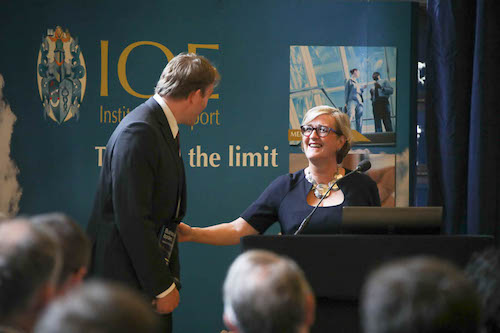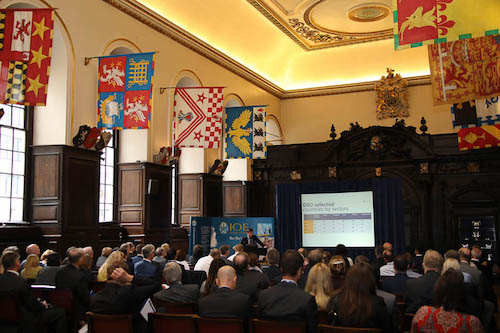
The Institute this week held its second World Trade Summit in London at the Stationers’ Hall near St. Pauls and it was certainly a fascinating and eye opening affair.
With the theme of the summit mitigating risk around Brexit, it’s fair to say that the general consensus among speakers was that the risks involved in Brexit are very serious, especially with uncertainty still reigning in regard to what direction Brexit will actually take.
Global trade must find ways to survive the threats of protectionism
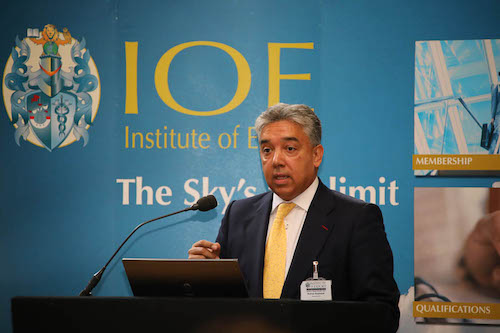
Arne Mielken, the Institute’s Young President, opened the session with his introduction to what the trade landscape ‘post-Brexit’ could look like. Arne reiterated the need for businesses to gain the skills needed to deal with potential new customs compliance requirements and tariffs.
Baihas Baghdadi followed Arne, representing summit sponsors Barclays, and he spoke about the risks to global trade posed by protectionist values. Baihas was keen to convey how the world prospers when global trade is allowed the freedom to thrive and warned that the UK and the USA will need to find ways for trade to operate freely following the protectionist economic jolts of Brexit and Trump’s US presidency.
The practical implications of Brexit
The rest of the morning’s presentations were of a more practical nature, with Kathryn Moon and David Marchant from Arthur J Gallagher and Jessica Gladstone from Clifford Chance talking about the potential impact of Brexit on how companies manage their insurance policies and legal approaches. Jessica finished with three great tips for exporters:
- Make your voice heard in terms of what you want a future trade to look like – whether it’s in the negotiations behind FTAs or the transition deal
- Assess the impact of Brexit on your supply chain
- Assess the legal implications of Brexit on all areas of your business – from HR to accounts
With a transition deal much discussed, Jessica was one of many to mention the need that businesses aren’t asked to change the way they operate twice, calling for the transition to maintain much of the status quo before broader changes are implemented with the final Brexit deal.
Panel discussion and the warning of a severe economic shock
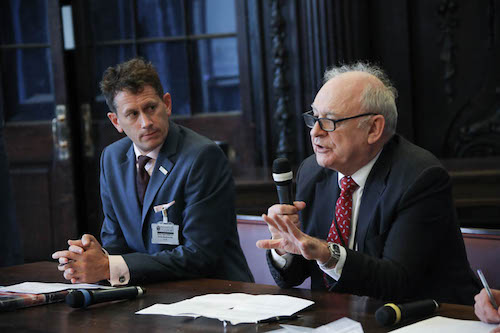
The morning concluded with a fascinating panel discussion on what the landscape post-Brexit might look like, featuring Chris Southworth (International Chambers of Commerce, UK), Dr John Llewellyn (Llewellyn Consulting), and Alex Veitch (Freight Transport Association).
Chris spoke of how the UK will desperately need to up its game in terms of making its voice heard in the international arena, mentioning that he is often one of only a few UK representatives at gatherings run by the WTO and other international trade organisations.
Dr Llewellyn warned of the severity that economic shocks like Brexit can have, drawing on his own experiences growing up in a New Zealand that was jolted out of shape by the UK’s entry into the European Economic Community and the resulting loss of preferential trade between New Zealand and the UK. He warned that something as huge as Brexit – something that could potentially completely rewire the UK’s entire economic system – is something of macroeconomic significance that could take decades to adjust from.
Alex Veitch then spoke of some of the more logistical impacts of Brexit on the UK, mentioning the need for the UK to invest in its infrastructure to be able to deal with the greater export demands that changed trading terms with Europe could bring in.
The panellists’ comments were followed by a series of lively audience questions ranging from hypothetical situations in which the EU crumbled, the need for the UK to start preparing its infrastructure for Brexit right away, and issues regarding the Northern Ireland border.
Heading into lunch, it’s fair to say that everyone was left with a full awareness of just how huge an impact Brexit could have.
Fascinating opportunities around the world
It wasn’t all doom and gloom though. Attendees were given some fascinating insights into the demand for UK offerings in huge markets like India and Ukraine by Brian Hyland (Sannam S4 Ltd.) and Dimitriy Gilgur (Vimes Consultancy).
Brook Horowitz, from IBLF Global, also shared some of his experiences working in high growth markets around the world, including advice on the challenges of bribery and corruption and what companies can do to ensure they aren’t sucked into fuelling these complex issues in world trade.
Currency, IP and AEOs
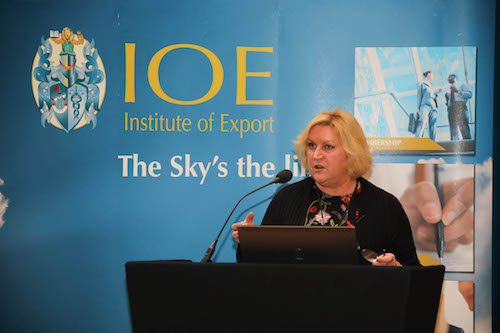
Rob Affleck from Currency UK spoke of the fascinating currency impact that Brexit has already had, discussing why the weakened pound hasn’t yielded the export boost many had expected, and advising that there are always ways to mitigate the risks of fluctuating currency rates.
Liz Ward from Virtuoso Legal then spoke of the need for the UK to embrace the fact that it’s future export strength could come from its intangible assets – services, culture, design – but warned that companies will need to ensure they are aware of the impact Brexit could have on their current intellectual property protection.
She also spoke of the potential impact of 3D printing on the IP world – something Arne also raised - noting that what we now call goods exports could eventually become classed as designs to be printed around the world, making IP an even more important consideration for businesses.
And Neil Bird from Miles Vartan Consultancy spoke of the increased need for UK businesses to look into gaining AEO (Advanced Economic Operator) status in order to be able to compete against its soon-to-be European competitors in the international supply chain. The UK currently lags way behind Germany in the number of its businesses that have AEO status.
A more positive note
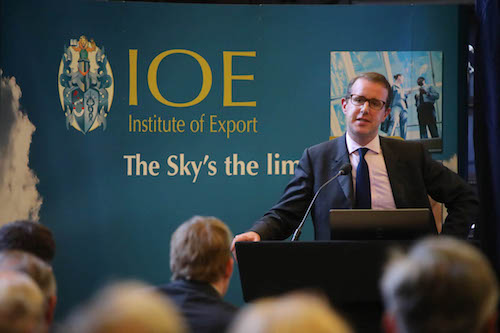
At last years World Trade Summit, Barclays’ Head of Equity Strategy Will Hobbs lifted everyone’s mood with a broader economic update, putting Brexit into the context of an overall positive time for human economic progress and innovation. He repeated the trick with this year’s ‘Economists’ Update’, highlighting that although the uncertainty caused by Brexit and Trump is never going to be great news for economies, this is otherwise not a terrible period of history to be doing business in.
In her update regarding the Institute’s session on ‘Learning International Trade’ at the WTO last week, Director General Lesley Batchelor was also keen to put Brexit into context, highlighting that there are several other countries in the world happy enough operating under the WTO rules which are bandied around as a worst-case scenario for the UK. She again highlighted the need for businesses to learn the skills to deal with the greater complexity of doing trade with our European partners following Brexit, pointing out that the number of transactions counted as import or export going over the UK’s borders could grow from 90m to 300m once the UK has left the EU.
And finally, giving the final keynote speech we were once again honoured to host the Institute president Lord Green of Hustpierpoint. Lord Green claimed that now is the time for the UK to up its game in terms of exports, to close the gaps on comparable economies in Italy, France and Germany, and learn the export skills that will be needed to make a success of Brexit.
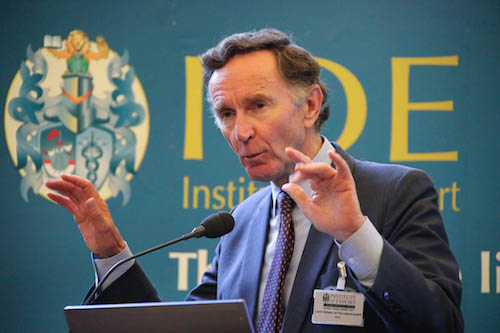
A fascinating day of warnings and solutions – thank you Barclays for sponsoring
It was once again a fascinating day of presentations touching on some of the implications of Brexit and what is set to be a significant period of change for the UK and its exporters.
We would once again like to thank Barclays for their contributions in making it such a vibrant and comprehensive event – there are few line-ups as wide-ranging and high quality as the one we had yesterday, and the Stationers’ Hall really was quite a stunning venue.
We hope everyone found the day enlightening. The risks for business that Brexit poses were at the fore of all the presentations, but there was plenty of context and practical know-how on offer to give hope that UK businesses will have the innovation and support to deal with these risks and emerge through this current period of uncertainty into a thriving post-Brexit landscape.
